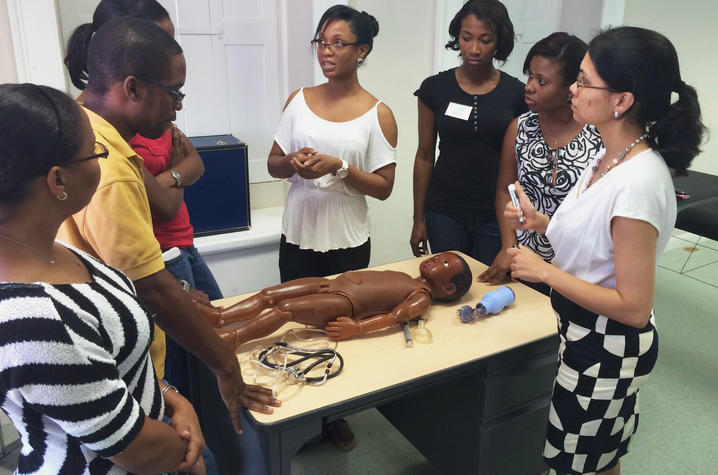Pediatrician Travels World Training Instructors on Systematic Critical Care
LEXINGTON, Ky. (Dec. 7, 2016) — The first 24-hours of treatment determine the outcome of a child diagnosed with a critical illness or injury in developing countries.
When health care practitioners respond with systematic approaches, children suffering from critical conditions such as shock or respiratory distress are more likely to survive. But physicians in resource-scarce countries often lack the advanced training to integrate such effective approaches.
Kentucky Children’s Hospital pediatrician Dr. Asha Shenoi has traveled around the world training health care providers to instruct courses on systematic pediatric critical care. Shenoi, who volunteers her time on behalf of the World Pediatric Intensive and Critical Care Foundation, is one of very few pediatric critical care specialists in the world designated by the organization to train physicians in developing or mid- to low-income countries on programmatic approaches to pediatric critical care. She is approved to administer the Pediatric BASIC critical care course that is a foundational course for improving outcomes for critically ill and injured children worldwide.
Shenoi trains doctors in areas with limited medical resources and technological advancement to treat critical conditions. Since joining the program in 2012, she has worked with pediatricians to adapt critical care training to specific parts of the world. She conducts a one-week training, which includes modules on running a skills station and coordinating simulations, and returns to the country intermittently for the next two to three years to update local instructors on current treatment methods. Instructors then host trainings for local and regional health care providers, imparting systematic critical care methods to unreached territories. The overarching goal of the program is to provide a sustainable system for improving critical care in disparate regions of the world.
In October, Shenoi trained physicians at the National Children’s Hospital in Vietnam. She has conducted seven courses in four countries, including India, Vietnam, and the West Indies, adapting each training to reflect the country’s native language and cultural considerations. The trainings emphasize dynamics and coordination in performing critical care procedures.
Shenoi learned about the program through her mentor and when she was completing a fellowship at Emory University. Since then, she has become one of five certified trainers in the U.S. She has purchased every plane ticket, and the institutions where she is training provide accommodations. A native of India, Shenoi aspires to change the course of treatment for disadvantaged children whose lives might be saved through systematic critical care interventions.
“The majority of childhood deaths in these settings result from preventable and reversible causes; in the end, often what saves a child life is early recognition and systematic intervention,” Shenoi said. “Unfortunately, training opportunities in critical care in resource-limited settings are scarce and we aim to train the trainers in these settings in developing locally relevant systematic critical care interventions.”






